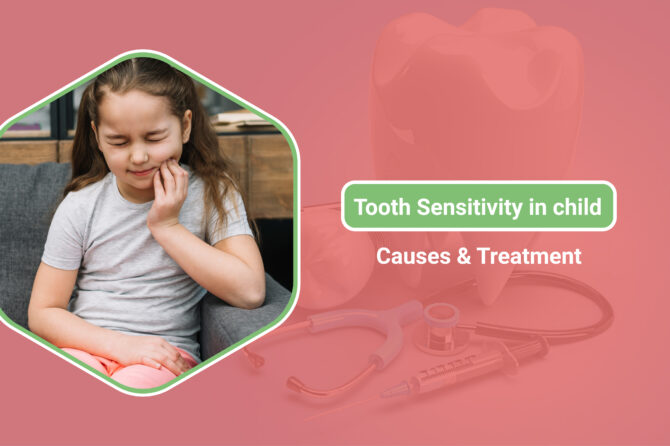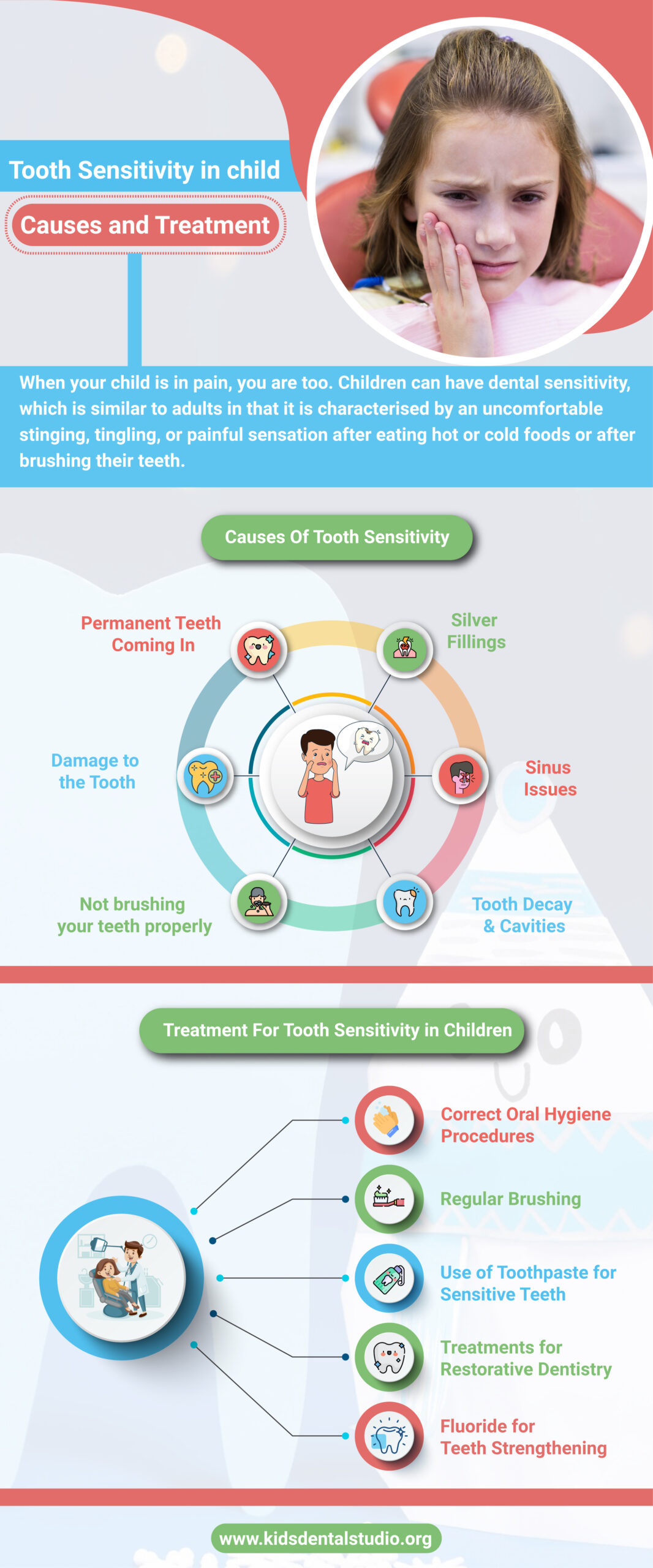
Tooth Sensitivity in Child: Causes and Treatment
When your child is in pain, you are too. Children can have dental sensitivity, which is similar to adults in that it is characterized by an uncomfortable stinging, tingling, or painful sensation after eating hot or cold foods or after brushing their teeth. You may already be familiar with the discomfort that sensitive teeth can bring from personal experience. In addition to hurting, tooth sensitivity occasionally points to a dental issue that needs immediate dental treatment and expert care. You want to understand everything you can about what might be causing a child’s tooth sensitivity and how you might lessen or perhaps eliminate this uncomfortable symptom as a concerned parent. Here, we’ll work to identify the root of your child’s tooth sensitivity and find a solution to the pain. Every step of the way, we are here to help your child’s dental health!
Why Do Teeth Become Sensitive?
When the dentin, a porous tissue beneath the tooth enamel, is exposed, tooth sensitivity results. The paths to the nerve are small channels called tubules that are found in the dentin. The nerves become easily stimulated by stimuli, such as cleaning teeth, hot or cold, or in certain circumstances, sugary treats, when these tubules are exposed as a result of enamel loss or receding gum tissue. A tooth is regarded as sensitive if pain is present right away but goes away quickly after the trigger is taken away.
Is My Child’s Teeth Sensitive, and How Do I Know?
If their teeth are sensitive, your kids will let you know. Sensitive teeth might exhibit a few distinct signs, which are noticeable. When consuming particular foods, consuming liquids, or brushing their teeth, children may start to complain about pain, tingling, or stinging in their teeth. They may have sensitive teeth if they cry out in protest when given the opportunity to consume particular foods or drinks, especially if they once loved them.
When your children are eating, keep close watch. Do they exclusively chew on one side of their mouth? When eating ice cream or chips, do they appear to be in pain? What happens if they floss and brush their teeth? These are all potential warning flags.
Causes Of Tooth Sensitivity
The sensitive teeth causes includes:
- Permanent Teeth Coming In: It won’t take much to cause dental pain and sensitivity when your child starts shedding baby teeth and growing permanent ones. Air, heat, and cold can all cause uncomfortable contact.
- Damage to the tooth: Sensitivity can result from a broken or chipped tooth that has exposed dentin. Trauma, biting down on tough foods, or the condition known as bruxism, which is the grinding of the teeth at night, can all cause chips and cracks.
- Not brushing your teeth properly: The wrong way to brush your child’s teeth can lead to tooth enamel loss and gum recession, which can increase the sensitivity of their teeth to both heat and cold.
- Tooth Decay and Cavities: To stop baby bottle tooth decay and cavities from getting worse, it is important to get treatment right away. They can make teeth sensitive and uncomfortable.
- Sinus Issues: Sinus issues can result in tooth sensitivity around the top of the mouth. As the sinus pressure increases, it might produce discomfort resembling that of an infected tooth.
- Silver Fillings: Tooth sensitivity can occasionally be brought on by silver fillings. Temperature fluctuations have a huge impact on this kind of healing. As a result, the tooth nerve may be subjected to increased pressure and may experience rapid expansion and contraction of the teeth, which could lead to hairline cracks and increased sensitivity to cold.
Treatment For Tooth Sensitivity in Children
The treatment for Tooth Sensitivity in child includes:
- Correct Oral Hygiene Procedures: Observing good oral hygiene practices might help lessen tooth sensitivity and is one of the most effective sensitive teeth treatment
- Regular brushing: The chance of acquiring cavities or gum disease is reduced by brushing twice a day and flossing every day to maintain the teeth and gums healthy. Another way to lessen the risk of irritation from aggressive brushing is to use a soft-bristled toothbrush and teach gentle brushing practises.
- Use of Toothpaste for Sensitive Teeth: Before permitting a kid under the age of 12 to use toothpaste for sensitive teeth, be sure to consult Smile Explorers Paediatric Dentistry.
- Treatments for Restorative Dentistry: Dental fillings or dental crowns may be necessary if your child’s teeth have any kind of damage, such as cracks, chips, or cavities. Your child’s restorations should be replaced with composite resin fillings if silver fillings are the cause of sensitivity.
- Fluoride for Teeth Strengthening: If cavities are the root of your child’s tooth sensitivity, in-office fluoride treatment may be able to help. The danger of severe tooth decay is reduced by fluoride’s ability to strengthen tooth enamel.
Is a sensitive tooth an indication of an infection?
Not constantly. The sensitivity of the teeth may occasionally be an indication of gum recession or tooth erosion (wear and tear). But it could also indicate that you have a broken or infected tooth. Tooth pain brought on by an infection may be aching and dull or throbbing and acute. For further information, call a dentist immediately away if you experience extreme tooth sensitivity that won’t go away.
Can a sensitive tooth ache disappear?
Yes. Teeth sensitivity can occasionally go away on its own, particularly if it was caused by root canal or filling that was recently completed. Consult a dentist if your teeth are sensitive and the problem persists. You can have eroded enamel or exposed tooth roots. In these circumstances, treatment may be necessary to address the problem.
Conclusion
Teeth sensitivity can be brought on by a variety of circumstances, including worn enamel, exposed roots, cavities, fissures, and even recent dental treatments. You could or might not need counselling, depending on the cause. Desensitizing toothpaste and proper oral hygiene can treat slightly sensitive teeth. Treatment may be necessary for severe tooth sensitivity brought on by gum recession, cavities, or damaged teeth. Your dentist can suggest a course of therapy to deal with the problem and assist in determining what is causing your sensitive teeth.
Being a parent you will always wish to provide your child with best treatment whether it is physical or dental. That is when Kids Dental Studio plays its role. The two doctors: Dr. Umangi Lekhadia and Dr. Kisha Mehta are the pioneers of pediatric dentistry. Make your appointment today to make your child life free from cavities!
Leave a reply
